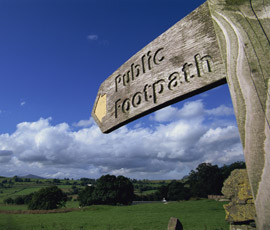NFU respond to public access consultation

The rights of way application process should be streamlined and made fairer for landowners, the NFU has said in its response to a recent government consultation.
DEFRA launched the consultation in May in order to speed up the troubled process of mapping every public pathway in the UK. Uncertainty over whether land is classed as a public pathway or not can be disruptive for farmers, who argue that DEFRA should speed up the procedure.
A key proposal in the consultation the NFU would like to see implemented is the 2026 cut-off date for new applications for historic rights of way. Currently, applications can take years to process and it is hoped that the proposals will significantly reduce this timescale.
In addition, the NFU believes the local authority, not the applicant, should approach the landowner or occupier only after the application has passed a new, basic evidence test. This will ensure that farmers are engaged only after weak applications have been screened out.
NFU countryside adviser Claire Robinson said: “The government should take every opportunity to make improvements to rights of way policy and legislation, in particular, to address areas where the current rights of way network is demonstrably out of date. Currently, it is difficult and costly to implement changes to the network.”
The Country Land and Business Association has told government it can only support the reform if the proposals are made more efficient for landowners.
The association said DEFRA’s proposed improvements should be about making the process more efficient to benefit both landowners and users.
CLA deputy president Henry Robinson said: “Reform of rights of way is desperately needed but the government must address the unfairness of the current system if the CLA is to continue to support reform.
“If reform does go ahead, landowners need reassurance that the 2026 deadline for adding abandoned and unused paths to the definitive map will be become a reality,” he added.
